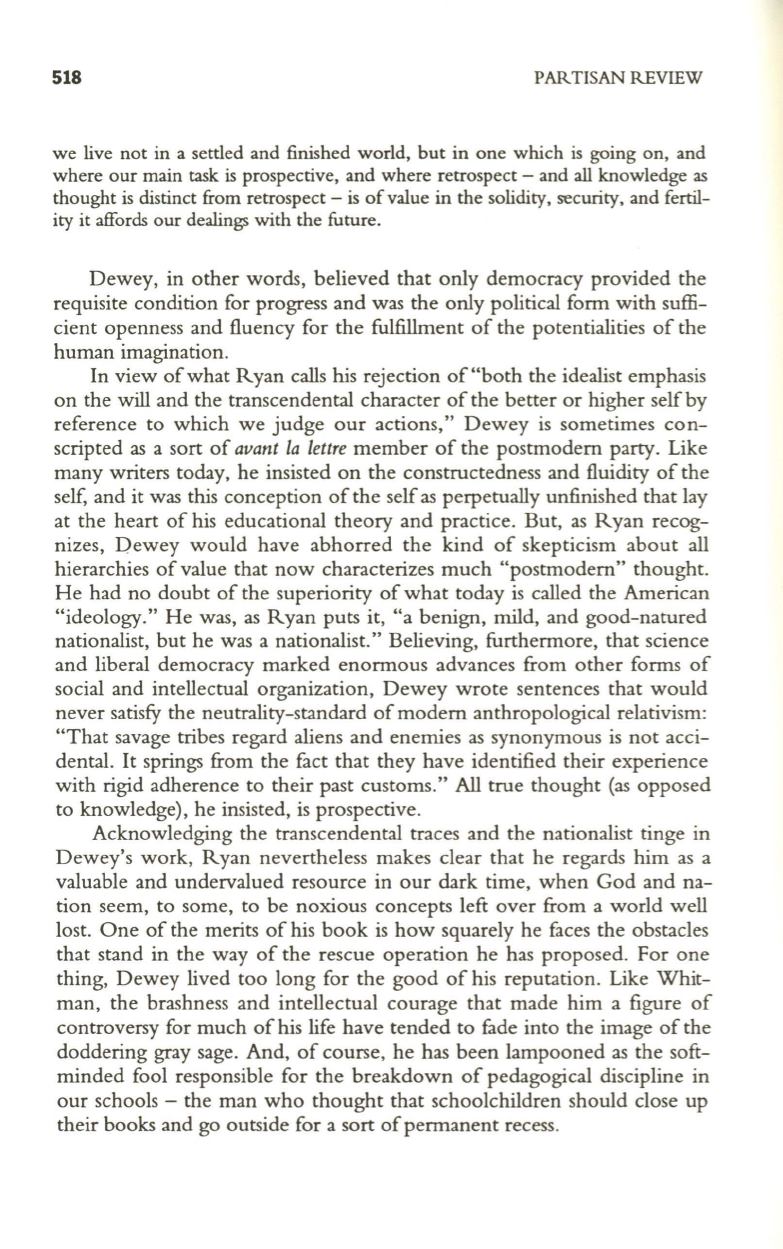
518
PARTISAN REVIEW
we live not in a settled and finished world, but in one which is going on, and
where our main task is prospective, and where retrospect - and
all
knowledge as
thought is distinct from retrospect - is of value in the solidity, security, and fertil–
ity it affords our dealings with the future.
Dewey, in other words, believed that only democracy provided the
requisite condition for progress and was the only political form with suffi–
cient openness and fluency for the fulfillment of the potentialities of the
human imagination.
In view ofwhat Ryan calls his rejection of "both the idealist emphasis
on the will and the transcendental character of the better or higher self by
reference to which we judge our actions," Dewey is sometimes con–
scripted as a sort of
avant la lettre
member of the postmodem party. Like
many writers today, he insisted on the constructedness and fluidity of the
self, and it was this conception of the self as perpetually unfinished that lay
at the heart of his educational theory and practice. But, as Ryan recog–
nizes, Dewey would have abhorred the kind of skepticism about all
hierarchies of value that now characterizes much "postmodem" thought.
He had no doubt of the superiority of what today is called the American
"ideology." He was, as Ryan puts it, "a benign, mild, and good-natured
nationalist, but he was a nationalist." Believing, furthermore, that science
and liberal democracy marked enormous advances from other forms of
social and intellectual organization, Dewey wrote sentences that would
never satisfy the neutrality-standard of modem anthropological relativism:
"That savage tribes regard aliens and enemies as synonymous is not acci–
dental. It springs from the fact that they have identified their experience
with rigid adherence to their past customs." All true thought (as opposed
to knowledge), he insisted, is prospective.
Acknowledging the transcendental traces and the nationalist tinge in
Dewey's work, Ryan nevertheless makes clear that he regards him as a
valuable and undervalued resource in our dark time, when God and na–
tion seem, to some, to be noxious concepts left over from a world well
lost. One of the merits of his book is how squarely he faces the obstacles
that stand in the way of the rescue operation he has proposed. For one
thing, Dewey lived too long for the good of his reputation. Like Whit–
man, the brashness and intellectual courage that made him a figure of
controversy for much of his life have tended to fade into the image of the
doddering gray sage. And, of course, he has been lampooned as the soft–
minded fool responsible for the breakdown of pedagogical discipline in
our schools - the man who thought that schoolchildren should close up
their books and go outside for a sort of permanent recess.


